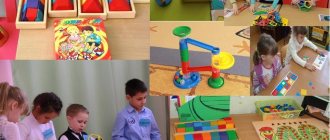The development of a child’s personality is a voluminous and labor-intensive process not only from external influences, but also from the child himself. Psychology deals with the problem. Modern ideas are based on the fact that the starting point of personal development is always the family, parents. It is the close environment that largely determines the prerequisites that will form the basis for development during childhood.
The process of personal development is presented at several stages. Each of them has its own specifics. Moreover, they are all closely related to each other, as are the factors of personality development. It is impossible to jump over any of them. In order to ensure the comprehensive development of a child’s personality, it is necessary to understand the features of the upbringing process for different ages.
What is personality?
The category “personality” is an integral element of the conceptual apparatus of a large number of scientific fields. In ordinary life, people use this concept quite often. There are a huge number of theories (for example, the systemic role theory of the formation of a child’s personality) devoted to the problem of personal development.
What is meant by personality and its development? What influences this process? Personality is a quality acquired by a person in the process of sociocultural life. Each person is born an individual, that is, he has a set of certain unique characteristics. Personal development occurs when interacting with society.
This process is divided into the following periods, which are determined by age boundaries. The stages of child personality development include:
- early childhood development, affecting ages from birth to three years;
- preschool and school childhood, which lasts from 4 to 11 years;
- adolescence, the duration of which is from 12 to 15 years;
- youth development - from 16 to 18 years.
The foundations for personality development are formed in the child’s body before the very process of birth. The author of the theory of basic perinatal matrices was Stanislav Grof. According to the scientist, it is precisely those experiences of the child that are associated with pregnancy, labor and the postpartum period that form the basis for the formation of four main matrices. The latter are the main conditions for further personal development.
With the natural birth of a desired child who has not experienced birth trauma, his life potential and adaptive capabilities are much higher compared to children who have gone through difficulties during pregnancy and birth. Interaction with the outside world occurs immediately after birth. It is this interaction that provides the basis for personal development.
Age stages and personality
A person becomes a personality when he reaches a certain level in mental development, when he develops views on the world, and begins to evaluate his own behavior. Personality is the result of cultural and social development. At each age stage, certain psychological qualities and relationships are formed, which shapes the child’s inner world and behavior.
The period up to 3 years is characterized by high plasticity and easy learning. The main character traits of a child are formed before the age of one year. Elementary moral qualities are formed at the same time. The task of education is to give children the basis for further development without harming their health and nervous system.
If a child moves little or is often in a depressed emotional state, this also affects his physical development. His physical ailment manifests itself emotionally in the same way.
Children from birth do not have ready-made forms of behavior. They learn the ability to stack cubes, draw, and speak from adults.
By the age of three, a child has his own position on many issues, realizes the difference between himself and other people, and becomes more independent.
Closer to school, children are able to evaluate their actions in comparison with the actions of friends and parents, and strive to take part in their activities. The process of socialization will be easier for the child, the better he adapts to society, learns the rules of behavior in it, and the closer the contact with his parents.
Personal development and education
Phases of personal development
Modern personal theories of development indicate that, regardless of the line of personal development, this process is determined by psychological patterns. Their presence does not depend on the age period or the specifics of the group in which the individual is located at a particular moment. These psychological patterns are called phases of personality development. Among them are the following:
- The first phase of development is adaptation. During it, a person must master those techniques and means of activity that are used by other members of the social group. Simple skills and language are mastered, speech is formed, which becomes a prerequisite for further development. Mandatory interaction with the social environment is necessary, during which speech develops. The process of mastering elements of activity is based on the experience of losing one’s individual characteristics. In reality, there is a continuation of human actions in other people and their activities. The individual shares his personal potential.
- The second phase of personal development is individualization. Its basis is the emergence of a conflict between a person’s need to be similar to the people around him and the desire for maximum personalization. A person contrasts himself with others, distinguishes his personality. During the process of passing through this phase, the individual is in search of means and ways to resolve this contradiction.
- The third phase is integration. In the process of passing it, a person learns to control his behavior based on submission to elders and interaction with others. In the case when the contradiction drags on for a long time, ways of resolving it are not found by man, disintegration occurs, that is, a problem in development. The formation and development of personality is carried out through exclusion from the social group. With actual isolation, negative qualities are consolidated in the character.
In some cases, the community, during the passage of the personality of the last stage, adapts to the needs of a particular person. He becomes a leader capable of influencing, determining the direction of development and functions of a social group.
The process of passing through the phases is strictly sequential. It is impossible to skip one of them in the process of normal personal development. When psychological patterns are violated, negative characteristics are formed. The reversibility of the process depends on the degree of disturbances, including in the development of speech; all this is individual.
Level of development of personal qualities
Each person is born with a certain character and set of personal qualities that determine behavioral characteristics and life priorities. Throughout life, some qualities change under the influence of various factors, some remain for life.
Psychologists say that the main stages of character formation occur in the first five years of life, then they are slightly adjusted based on life circumstances.
The main indicators and criteria that form the level of personal development include: the ability to take an active life position, the level of responsibility, the direction of the way of life, the level of culture and intelligence, the ability to manage emotions.
Many aspects of life depend on personal qualities, from the choice of clothing style to the priority of activities for a future profession. If a person realizes the need for a higher quality standard of living, he will try to achieve what he wants. Personal qualities such as determination, self-confidence, and the ability to adequately assess reality and one’s capabilities help with this. Even if a person’s innate characteristics are not at the highest level, but with awareness of one’s individuality, there is always the opportunity to decide on an activity that will most fully reveal a person’s abilities. Moreover, if desired, there is always the opportunity to develop personal qualities.
The importance of parents for personal development
Personality and its formation in childhood are largely determined by the immediate adult environment. In most cases, they are parents. They determine the success of passing through the stages of development - the upbringing and formation of the child’s personality, activating speech. Relationships with father and mother contribute differently to this process. Family unity is a condition for the formation of different structures at the psychological and age level.
The mother's influence on the formation of the child's personality is reflected in many theories. It is especially important during the first year of life. During this period, the presence of a loved one who shows care, attention, and gives a lot of good emotions plays a major role in establishing positive qualities. Personality development in early childhood is largely determined by the emotional component. The absence of mothers for children from orphanages has a negative impact on the entire process. The sooner a foster family appears, the easier it is to correct the negative experience of family upbringing.
Speech acquisition is just happening. As we grow older, communication becomes a priority. Its absence negatively affects the factors of implementation of the phases of personal development. Therefore, the role of parents in shaping the child’s personality is invaluable. Their task is to ensure that the prerequisites for personality formation are created in early childhood. This requires the presence of positive emotions, adequate communication (so that speech develops) and assistance in the process of personal development.
Methods for developing personal qualities
The most important thing that a successful person should have, regardless of his professional activity, is self-confidence. This is the basis in any profession. It is not necessary to have leadership and lead everyone, it is enough to be able to adequately assess yourself and your capabilities, all possible risks. If you take on a task, you should never give it up if difficulties arise.
There are several basic methods that help in the development of personal qualities.
Introspection
The first step should be self-analysis to help highlight the qualities that you already have. Having decided on the missing qualities, you should choose ways to form them. This is a long and difficult process. It is important to initially decide on the desired result and develop several ways to achieve it. A prerequisite for success is the presence of deadlines for achieving the goal and an example to follow.
The meaning of preschool age
If the development of personality at an early age was aimed at the emotional perception of the environment, then in preschool age the situation changes. This period is characterized by a more active perception of information. There is an expansion of social contacts, the appearance of the first team in the child’s life - a group in a preschool institution. Parents still play a decisive role. They form a polarity of attitude towards the world around us (positive-negative).
In preschool age, work activity acquires special value. Despite the fact that the child does a lot of things with mistakes, he needs to be taught simple work skills. In this case, the simple rules of life should be explained: good-bad, right-wrong. Communication allows a child not only to expand his vocabulary, but also to learn universal human values. Children must understand the need to respect elders and the rules of politeness. The presence of both parents in the family contributes to the formation of role identity.
Receptive type
This is probably the most convenient character type for educators. After all, children with a receptive character type adore rules, constancy, rhythm, routine, repetition of the same actions. They are easy to “manage” in kindergarten and at school, they easily get up in the morning, wash and brush their teeth without reminders, and easily cope with tasks that they have worked through carefully. But situations when novelty suddenly appears, when you need to be smart or take some action that was not discussed in advance, “block” the child’s psyche. Such children make excellent performers, but they will never become leaders. Making a decision on their own is akin to accomplishing a feat for them.
Considering the nature of the behavior of children belonging to the receptive type, it should be noted that they, like children belonging to the sensitive type, are characterized by sensitivity and a tendency to experience. These are very sensitive and responsive kids. And if you skillfully instill in them the ability to make independent decisions, then they will turn out to be wonderful family men and loyal friends.
You can begin to foster independence in early childhood. For example, you should allow them to buy something for themselves in the store, pay for the purchase themselves, or choose a gift for their sister or teacher. Even choosing clothes in the morning is already an action. Any small actions that the baby performs on his own, guided by his own desire, should be encouraged. And in no case should you offend a person with mistrust if he makes a mistake. Explain - yes, show another option - yes. But don’t scold, don’t punish, don’t make people laugh.
The process of education as the basis for the personal development of children of different ages
The process of comprehensive personality education is labor-intensive. The definition of essence consists of what is included in the understanding of the educational impact on the child. For some it is obedience, for others it is punishment. However, the basis of the upbringing process should be the multilateral development of the child’s abilities and the formation, based on the existing base of natural inclinations, of a harmonious, full-fledged system called personality.
In any situation, the basis of the education process is the family. Its influence is discussed in the works of psychologists and teachers. In the absence of mother and father, this role is assigned to the child’s immediate environment. However, it is in a full-fledged harmonious family that the prerequisites for an adequate personality begin to form, traditions and customs are passed on, which in the future will form a worldview system. The manner of behavior that was a model for him in childhood will be the personal norm throughout the rest of his life. The role of family traditions in the formation of personality is enormous. They allow family values and cultural characteristics to be passed on to subsequent generations, helping to maintain continuity.
For a young child, healthy family relationships are a priority. Rarely does a person as an adult be able to change the existing negative standard. In this case, the person must go through a difficult path of reassessment of values.
Education should not become an end in itself for parents. However, their task is to ensure development in such a way as to create optimal conditions for the purposeful formation of a harmonious personality and prepare it for further life in society. Some parents try to be perfect. You shouldn't be afraid to make mistakes. They are the basis for working on yourself and self-improvement. Moreover, we are talking not only about a child, but also about an adult. Parents must teach their child to be responsible for their actions and take responsibility for their life.
When organizing the education process, you should take into account some features of age-related development. Until the age of three, attention to him and his problems is of great importance for a child. At this age, mother and child are one. Therefore, ignoring requests and appeals is dangerous for mental development. At this age, the child’s cognitive activity is great. Dangerous objects should be excluded from visibility so that the learning process is accompanied only by positive emotions.
After three years, according to ideas in psychology, a child learns to manipulate an adult. Therefore, it is necessary to clearly define the concepts “possible” and “impossible”. The determining system of relations between an adult and a child should be explanatory and contractual. At the age of 5 to 7 years, a child develops fears. The main thing during this period is not to contribute to the development of phobias, but to gently destroy negative emotions.
Formation of a child’s personality in the family
School, society, and a friendly environment, of course, leave an imprint on the formation of a child’s harmonious personality, but the foundation, behavioral model, and manner of communicative interaction are laid by the family. It is what the baby hears and notices in childhood that will be the standard of behavior for him. Since the norms of behavior in society are not yet available to him, the standard for him will be his parents and other participants in family relationships. In fact, he will copy their behavioral model. This is how the formation of a child’s personality in the family is manifested. And the older the kids become, the more they display character traits and behavioral characteristics similar to their parents.
The family plays the role of an intermediary between society and the child. It is necessary for the transfer of social experience to him. Through communicative interaction within the family, the child masters the moral values and norms of behavior that prevail in a given society. The family is the most effective mentor and leading factor determining the formation of a child’s harmonious personality, especially in his first years of life.
Each individual family relationship develops its own individually specific system of education, the foundations of which are certain moral and value guidelines, as a result of which the so-called “family credo” is formed.
Thus, according to modern ideas, the formation of the personality of a preschool child and his upbringing up to one year should be based solely on the creation of ideal conditions for the development of a physically healthy organism, an intellectually and emotionally formed personality. At this stage, any restrictive influences and attempts at moralizing will be ineffective.
Only after the baby reaches the age of one year should one begin to introduce him to certain social attitudes and moral and ethical ideas. However, you still shouldn’t demand immediate compliance from them, as this is useless. After two years of age, one can appeal to ethical standards more persistently, and at three years of age one can urgently demand their compliance.
The peculiarities of the formation of a child’s personality in relationships where people are connected by family ties lie in the great realism of the social experience children acquire in the family. Since the child builds his own worldview through the prism of the observed actions of close relatives, he forms judgments about the value of phenomena and things.
The team is the driving force
The period of active interaction of an individual with the surrounding society becomes preschool age. At this stage, the child gets acquainted with the first team - a group in kindergarten. The factors influencing the development of a child’s personality include not only communication with peers, but also with adults. The latter role is now played by parents and teachers of preschool institutions.
When entering kindergarten, children can clearly trace the passage of phases of personal development. Initially, the child adapts to the conditions of the group. Then individualization is observed, when separation from the collective occurs. This can be done in several directions: the child excels in various activities, plays pranks or is obedient. The success of passing the patterns depends on many factors: family, the social group itself, personal prerequisites.
The development of a child’s personality is a long, voluminous and very responsible process. The role of family is of great importance. The formation of personality at an early age is largely determined by the degree of influence of parents, their attitude to society, to life, to universal human values. The team in which the child is located contributes to personal development at other age periods. The task of modern adults is to take care of a comprehensive understanding of education and to build a systematic approach.
Adolescence and personality development
During adolescence, the conditions for the development of a child’s personality change, he does not move to a new group, the group itself changes. At this age, communication in the company of peers becomes increasingly important for him. Now their opinion and assessment become equal or even more authoritative than the opinion of parents and teachers. In adolescence, there is another feature of the development of a child’s personality - too rapid changes in the socio-psychological structure of the group in which he is located lead to an identity crisis, which is characterized by a spirit of contradiction and the desire to gain one’s own experience.
As a rule, by the age of 18, the process of formation and development of a child’s personality is completed; it is no longer possible to radically change it, you can only guide the young person and correct his behavior. Therefore, it is necessary to instill in a child moral and ethical values and teach him norms of behavior from an early age. It should be understood that a child’s character is a consequence of the life experiences he has. It depends on the conditions of development of the child’s personality. In the initial stages of development, a child's beliefs and norms of behavior are formed based on what he sees in the family. As a child grows up, more and more factors appear that influence the social development of the individual, he is surrounded by more good and bad role models, he sees different situations, which form his opinion about everything he encounters in life. At this stage, only the positive example of the parents may not be enough; you need to talk with the child as much as possible, explaining to him in an accessible form the basic human values. The main task of parents at the stage of growing up of a little person is to maintain his trust, then they will definitely be able to raise him to be good and kind.
Rate this article: 4.1 4.1 out of 5 (10 votes)
The role of parents in the moral education of children
Conscientious parents want to raise their child as ready as possible for social life. But not everyone correctly understands the essence of this process, mistakenly believing that ordinary (subject) education will allow their children to integrate into social life calmly and at ease. This is a common mistake that can be a big problem later.
Very often, a child’s education has nothing to do with his moral education, which, as is known, is realized precisely after long and laborious work with the formation of the child’s worldview and concepts. A child can be an absolute excellent student and a genius at school, and at the same time he does not value his parents at all, and if he does anything, it is only to satisfy his whims (formula: you give me - I give you).
To resolve these problems, you need to understand one truth: a tolerant, responsive, empathetic child is not born this way, this is the direct merit of his parents. It is a reflection of those relationships that directly manifest themselves to him or are present in the family.











